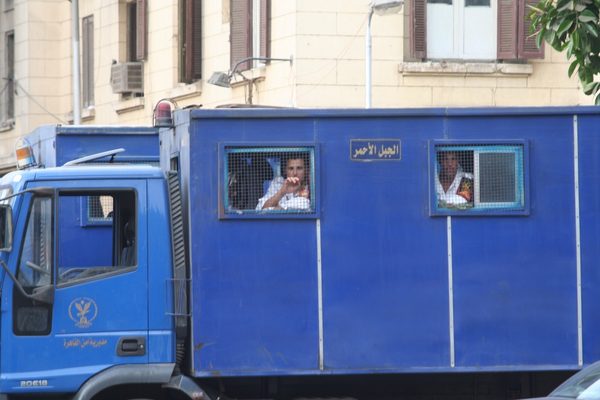By Haitham Ghoniem, Egyptian human rights activist and researcher at the Egyptian Commission for Rights and Freedoms
It was in the first week of this April, before noon prayers, when the doorbell rang. My mother saw a muscular man dressed in a white shirt and trousers standing at the door. She was too scared to open it, especially as he looked like a military man.
He rang the bell several times. When no one answered, he knocked on the door of the flat opposite and asked our neighbour if someone named Haitham Ghoniem lived here. He questioned her about my whereabouts: asking when I leave home, when I return and whether my family lives with me or not. Then he proceeded to scour the entire building.
My mother called and warned me not to come home ever again.
Enemy of the state
I should not have been surprised. My nightmare began three months earlier, in January, when I was arrested while on my way to the mosque for afternoon prayers.
The police were randomly detaining people who had taken part in demonstrations against the military ahead of the third anniversary of the 25th January Revolution. I was beaten in prison from the first day of my arrest. I was slapped on the face and struck on my head and chest because I did not succumb to their humiliation and answered back while being questioned. I refused to be photographed beside the weapons they placed in front of me or to confess that the weapons were mine. It infuriated them. I also witnessed other people being tortured: women, men, even children.
After 26 days, I was finally released on health grounds. While I rested at home, my family and friends pleaded with me to stop talking about the human rights violations committed by police.
My friends advised me to leave the country because they knew that I would not remain silent. They were right.
Haitham Ghoniem
I discovered that one of my friends who was working at TE-Data, a local internet provider, had been kidnapped outside his workplace.
I tried to find out where he was being detained, but all I was able to discover was that he had been abducted by the national security forces and was held somewhere in Ismailia.
That was when, despite the warnings from the people closest to me, my search began.
Egypt: the land of secret prisons
After 10 days of investigating, I learned that dozens of political detainees are being held at a secret prison in Ismailia, 130km north-east of Cairo. People were too scared to even utter its name.
I used my Facebook account to appeal for information about a prison in Ismailia. I also found a story published by El-Nadeem Center, an Egyptian human rights organization, which mentioned Al Azouly Prison.
I held several meetings with human rights advocates and lawyers, who all warned me to keep away from the prison and avoid stirring up trouble.
Then I received a message from a relative of a detainee held in a prison in Al Galaa Military Camp. She said their family was too frightened to speak out about it.
It became clear to me that they were speaking of Al Azouly Prison, which is located in Al Galaa Military Camp, inside the headquarters of the Second Field Army Command, in Ismailia.
Al Azouly Prison: ‘the slaughterhouse of Ismailia’
I started posting details on Facebook about the prison and about political detainees held there. The barrier of silence was broken. Rassd News, an online media network, picked up the news as well as the Financial Times and Al Jazeera News Channel.
More people started warning me that I was putting myself in danger but, after I published my reports, human rights advocates started to speak up about Al Azouly and to document more cases.
Other people started contacting me and telling me about other violations taking place. I learned that political detainees in Egypt are being subjected to levels of torture I did not imagine, such as suspension in contorted positions, electrocution in sensitive parts and even sexual assault. The torture methods used in Egyptian prisons range from physical, to sexual, to mental. The brutality of the police has no limit.
Paying the price for speaking out
I have not been home since my mother’s warning. For three days afterwards, a plainclothes detective was stationed in front of our building. Soon he was replaced by a “street cleaner” who suddenly appeared sweeping the stretch of road in front of our building. There are no street cleaners in any of the surrounding streets. I know National Security officials are after me because of my work on Al Azouly Prison and the violations taking place in Egyptian prisons. As my friend, a human rights lawyer, told me: “You are now challenging them, they won’t leave you alone”.
This is the state of the country we call home.
Never would I have imagined that I would be writing about this horror three years after the 25 January Revolution, when our hopes were so high and we believed that we had regained our dignity and pride.
Today, our friends are either dead, injured, detained, stalked by the police or have fled the country in fear.
But we will not lose hope.


